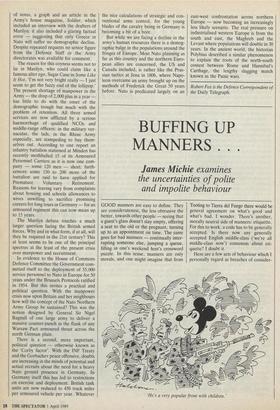BUFFING UP MANNERS . . .
James Michie examines
the uncertainties of polite and impolite behaviour
GOOD manners are easy to define. They are considerateness, the less obtrusive the better, towards other people — seeing that a guest's glass doesn't stay empty, offering a seat to the old or the pregnant, turning up to an appointment on time. The same goes for bad manners — continually inter- rupting someone else, jumping a queue, filling in one's weekend host's crossword puzzle. In this sense, manners are only morals, and one might imagine that from Tooting to Tierra del Fuego there would be general agreement on what's good and what's had. I wonder. There's another, morally neutral side of manners: etiquette. For this to work, a code has to be generally accepted. Is there now any generally accepted English middle-class ('we're all middle-class now') consensus about eti- quette? I doubt it.
Here are a few acts of behaviour which I personally regard as breaches of consider- 'He's a very popular front with children.' ateness, but which are common enough: playing tapes in cars without consulting the wishes of the passengers; talking during dinner only to the person on one side; taking photographs of other guests without asking whether they mind; turning up at a friend's house unannounced; smoking be- tween courses, whether you are host or guest (and I speak as a heavy smoker); writing letters in what you must have often been told is an indecipherable hand; read- ing, for however short a time, in a room in a private house in which there is general conversation; bringing an uninvited guest to a party without first telephoning the host; driving faster than elderly passengers find comfortable; using a telephone with- out your host's permission; going to the theatre with a hacking cough.
Whether or not these offences strike my readers as clear, nothing seems clear in the realm of etiquette. Do you still use 'Es- quire' on your envelopes, or even 'Mr'? (I've given them up, unless I think the addressee would mind, which is surprising- ly often.) Do you still walk on the traffic side of the pavement when accompanying a woman? (I don't, because I thought it was all about hansom cabs and flying mud, but I know a girl who finds it charming.) Is it cheeky to mend your host's fire? (In parts of Ireland it's acceptable after seven years' acquaintance.) Is it rude not to write a `bread-and-butter' letter after staying the night with anyone not family or close friend? (Yes. And guilty, my lord.) Is it brutta figura to make up one's face or comb one's hair in public? (Irrationally I dis- approve because it was one of my mother's betes noires. Easier to defend is my dislike of the un-hand-covered yawn: it's not so much the implication of boredom as the revelation of fillings that jars.) Nowhere is social uncertainty so evident as in the rituals of arrival and departure. On being introduced, some shake hands, others don't. I have watched uncertain young men enter a room like gun-slingers, hands dangling at holster-level, ready for any contingency. Some say, 'How do you do?', others 'Hello', others 'Hi', and yet others 'Pleased to meet you', a strange assumption. A small school of thought follows the Continental practice of always shaking hands on meeting and parting. Then there are the kissers and the non- kissers, the former dividing into the one- cheekers and the both-cheekers (in one region of France you even find thrice- kissing folk, who negotiate each other's hair-styles and spectacles with great adroit- ness). For myself, I wish that 'the kissing had to stop' — it's like tipping, very difficult to lay off once you've started. To complicate matters, people variously intro- duce each other by title or by first and surname or by first name only, and if the second method is used nobody seems confident about the state of intimacy, or liking, or toleration at which it's all right to use the Christian name. They order this matter better in France, where formality prevails but to and vous are free to do their subtle work. Finally, when a group is sitting in a room and a stranger enters, does everybody rise to greet him or her, or only the men? If there's to be a conven- tion, it should surely relate to age, not sex.
Now for a few random observations. As a guest I prefer to bring flowers rather than a bottle; first, because there's no chance of the flowers being either too good or too bad, and secondly, because they're more likely to reflect the taste of the entertainer who's put in the major effort, the hostess. I think it's uncouth to telephone before 8.30 in the morning, and wise to begin all calls with a conventional 'How are you?' (I once rang a friend and launched into a comic monologue only to learn at its end that his mother had died that day.) My pet hatred is people who suffer from 'vestibulitis', departing guests who linger interminably in the porch, bantering and reconfirming arrangements, while the baby wakes and cold air streams in, and then drives off with a series of valedictory hoots.
Confusion rules, but does it rule OK? Does it all matter, or is it a typically English hangover from the stale U and non-U preoccupation of the Fifties, sparked off by a learned article by my old tutor, Alan Ross? An accepted code of etiquette saves time and thought, if not embarrassment any more. We don't need a new Lady Troubridge to tell us which way to tip our soup-plates while spooning, but we do need a rough consensus to get us effortlessly through the simple mechanics of social life. Yet these days it would be a bold author who risked a 'What to do' book. How reviewers would relish their one-upmanship!



















































 Previous page
Previous page